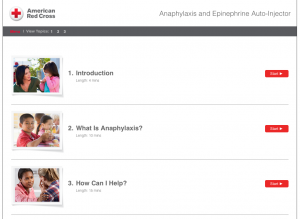By: Stephen Glockenheimer, Vice President, Preparedness, Health and Safety Services, Product Development at the American Red Cross
President Obama has signed into law a bill that provides incentives for schools to store on hand lifesaving epinephrine — medicine critical for students and school staff who experience a life-threatening allergic emergency.
This type of emergency, medically known as anaphylaxis, results in approximately 1,500 deaths annually, with children and adolescents among those facing the most risk. Preparedness in the school setting is critical with the rate of food allergies among U.S. children on the rise.
The law comes on the heels of efforts by the American Red Cross to update its training in the proper use of epinephrine injectors, sometimes referred to by the popular brand name EpiPen, which can save a life when a person is having a dangerous allergic reaction.
The American Red Cross has revised its epinephrine injector training to make it available as an on-line course. The goal is to dramatically increase training accessibility for school personnel across the nation.

The course teaches the signs and symptoms of anaphylaxis, how to care for a person having a severe allergic reaction, and how to administer the epinephrine auto-injector device.
This course is available in its original 45-minute classroom format or a new 30-minute online format. The classroom course includes a mixture of lecture, discussion and skill practice. The online course includes video presentations, activities and quizzes that allow participants to apply their knowledge. Participants will also receive information on how to request a free EpiPen® (epinephrine) Auto-Injector training device to practice skills. Upon completion, participants must pass a 10-question learning assessment to complete the online course.
Not all states require the availability of epinephrine in schools, and parents of children with severe allergies should ask educators and nurses at their children’s schools if they have taken or know about the Red Cross training. The law’s backers are also hoping that more states will change their requirements now that this new measure has passed.
“Currently, less than half of the states have legislation concerning the stocking of epinephrine inschools,” said Rep. Michael Burgess, R-Texas. “Keeping a stock of nonstudent-specific epinephrine in schools is a lifesaving measure and should be implemented nationwide.” The new law “is an important step to protect children who do not know that they are at risk for anaphylaxis.”
Rep. C. K. Butterfield, D-N.C., said approximately 30 states are working on legislation that would permit schools to keep injectors that aren’t designated for particular individuals. H.R.2094 “would encourage the remaining states to work on enacting similar legislation.”
